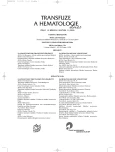-
Medical journals
- Career
Efficacy of rituximab as consolidation of first – line CHOP regimen in patients with follicular lymphomas
Authors: D. Belada 1; R. Pytlík 2; M. Trněný 2; J. Malý 1
Authors‘ workplace: II. interní klinika, Fakultní nemocnice Hradec Králové, oddělení klinické hematologie 1; I. interní klinika VFN Praha 2
Published in: Transfuze Hematol. dnes,11, 2005, No. 1, p. 10-13.
Category: Comprehensive Reports, Original Papers, Case Reports
Overview
Follicular lymphoma is the second most common type of lymphoma. First line treatment with chemotherapy can lead to the clinical remission in part of patients but other patients have residual disease. The aim was to evaluate the efficacy of monoclonal antibody anti CD20 – rituximab – as a consolidation therapy after induction treatment of CHOP in patients with newly diagnosed follicular NHL. 40 patients with residual lymphoma after CHOP regimen were treated with rituximab, either in monotherapy or in combination with salvage chemotherapy followed by high dose therapy with stem cell support. We assessed efficacy and tolerance of the treatment. In 28 patients (70 %) complete remission was achieved and no progression during treatment of rituximab was noticed. Toxicity of the treatment was minimal. These results are encouraging for patients who not achieve CR after initial treatment of CHOP regimen alone to extend lymphoma free period and improve their quality of life. But in September 2004 rituximab was approved for the first line treatment of patients with follicular lymphoma in the Czech republic.
Key words:
follicular lymphoma, rituximab, residual disease
Labels
Haematology Internal medicine Clinical oncology
Article was published inTransfusion and Haematology Today

2005 Issue 1-
All articles in this issue
- Endothelium and haemostasis
- Efficacy of rituximab as consolidation of first – line CHOP regimen in patients with follicular lymphomas
- Non-invasive fetal RHc genotyping from maternal peripheral blood
- First experience with non-invasive foetal RH genotyping from maternal peripheral blood in alloimmunised pregnancies
- Transfusion and Haematology Today
- Journal archive
- Current issue
- Online only
- About the journal
Most read in this issue- Endothelium and haemostasis
- Non-invasive fetal RHc genotyping from maternal peripheral blood
- First experience with non-invasive foetal RH genotyping from maternal peripheral blood in alloimmunised pregnancies
- Efficacy of rituximab as consolidation of first – line CHOP regimen in patients with follicular lymphomas
Login#ADS_BOTTOM_SCRIPTS#Forgotten passwordEnter the email address that you registered with. We will send you instructions on how to set a new password.
- Career

